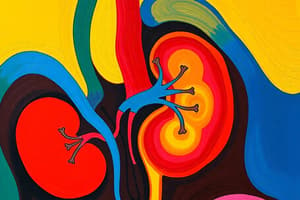Podcast
Questions and Answers
What is the main function of the kidneys?
What is the main function of the kidneys?
The kidneys are the main excretory organs of the body. They are responsible for filtering waste products from the blood and producing urine, which is then excreted from the body.
What is the functional unit of the kidney?
What is the functional unit of the kidney?
The functional unit of the kidney is the nephron.
Which of the following is NOT a function of the kidneys?
Which of the following is NOT a function of the kidneys?
- Elimination of waste products
- Regulation of blood volume
- Production of red blood cells (correct)
- Regulation of blood pressure
Inulin clearance test is considered to be the most accurate measure of GFR.
Inulin clearance test is considered to be the most accurate measure of GFR.
Which of the following is a test for measuring tubular function?
Which of the following is a test for measuring tubular function?
Which of the following is NOT a clinically significant non-protein nitrogen compound?
Which of the following is NOT a clinically significant non-protein nitrogen compound?
Urea is the first metabolite to increase in kidney disease.
Urea is the first metabolite to increase in kidney disease.
Which of the following is a direct method of measuring creatinine in serum?
Which of the following is a direct method of measuring creatinine in serum?
What is the major end product of purine metabolism?
What is the major end product of purine metabolism?
Azotemia refers to an increase in BUN and creatinine levels, indicating kidney dysfunction.
Azotemia refers to an increase in BUN and creatinine levels, indicating kidney dysfunction.
The most frequently used method to measure creatinine is the direct Jaffe method.
The most frequently used method to measure creatinine is the direct Jaffe method.
Which of the following is a potential issue when using the Direct Jaffe method for measuring creatinine?
Which of the following is a potential issue when using the Direct Jaffe method for measuring creatinine?
What is the major end product of protein and amino acid metabolism?
What is the major end product of protein and amino acid metabolism?
Which of the following clearance test is considered to be the most accurate measure of GFR?
Which of the following clearance test is considered to be the most accurate measure of GFR?
The Berthelot reagent is used in the determination of creatinine.
The Berthelot reagent is used in the determination of creatinine.
Flashcards
Kidney function
Kidney function
Kidneys filter blood, remove waste, regulate water balance, and maintain electrolyte and acid-base balance.
Nephron
Nephron
The functional unit of the kidney responsible for urine formation.
Glomerulus
Glomerulus
Region in the nephron where initial filtration of blood occurs.
Glomerular filtration rate (GFR)
Glomerular filtration rate (GFR)
Signup and view all the flashcards
Creatinine clearance
Creatinine clearance
Signup and view all the flashcards
Blood Urea Nitrogen (BUN)
Blood Urea Nitrogen (BUN)
Signup and view all the flashcards
Urea
Urea
Signup and view all the flashcards
Inulin clearance
Inulin clearance
Signup and view all the flashcards
Cystatin C
Cystatin C
Signup and view all the flashcards
Non-protein nitrogen compounds (NPN)
Non-protein nitrogen compounds (NPN)
Signup and view all the flashcards
Uric Acid
Uric Acid
Signup and view all the flashcards
Gout
Gout
Signup and view all the flashcards
Azotemia
Azotemia
Signup and view all the flashcards
Renal blood flow
Renal blood flow
Signup and view all the flashcards
Tubular function
Tubular function
Signup and view all the flashcards
24-hour urine sample
24-hour urine sample
Signup and view all the flashcards
Specific gravity
Specific gravity
Signup and view all the flashcards
Osmolality
Osmolality
Signup and view all the flashcards
EPO (Erythropoietin)
EPO (Erythropoietin)
Signup and view all the flashcards
RAAS system
RAAS system
Signup and view all the flashcards
Study Notes
Kidney Function and Non-Protein Nitrogen Compounds
- Kidneys are bean-shaped organs found in vertebrates, located in the retroperitoneal space.
- In adults, they are about 11 cm long.
- Kidneys receive blood from renal arteries and send blood out through renal veins.
- The ureter carries urine from the kidneys to the bladder.
- The nephron is the functional unit of the kidney, responsible for urine formation (filtration, secretion, and reabsorption).
- Each kidney contains roughly 1.25 million nephrons.
- Kidneys are responsible for eliminating waste products and regulating plasma and water volume, maintaining ionic balance, and regulating acid-base balance.
Kidney Functions
- Elimination of metabolic waste products: Kidneys are the major excretory organs of the body, responsible for removing waste and toxic metabolites. This is carried out through urine formation.
- Regulation of plasma and water volume: Kidneys play a crucial role in maintaining the appropriate volume and composition of the blood and interstitial fluids, by adjusting the water and solute content of the blood.
- Regulation of ionic equilibrium: Kidneys regulate the concentration of various electrolytes.
- Maintenance of acid-base balance: Kidneys, along with the lungs, work together to maintain optimal pH levels.
Clearance Tests
- Inulin clearance test: Considered the most accurate measure of glomerular filtration rate (GFR). Involves IV transfusion and multiple urine samples.
- Creatinine clearance test: Often used to estimate GFR, particularly for patient muscle mass assessment. It's sensitive to kidney function, but not perfectly reliable.
- Urea clearance test: Measures the clearance of urea from the blood. Less reliable than creatinine, given variable urea reabsorption in the nephron.
Other Tests
- Cystatin C: Produced by all nucleated cells, not secreted, but completely reabsorbed. Used as an indicator of GFR. Levels increase more rapidly than creatinine in early stages of GFR problems.
- Beta-trace proteins: Function as prostaglandin synthase, easily filtered and reabsorbed. Elevated levels can indicate myeloproliferative and lymphoproliferative disorders, inflammation and renal failure.
- Myoglobin: Associated with acute skeletal muscle injury. Used as a potential marker of myocardial infarction and rhabdomyolysis.
- Microalbuminuria: Small amount of albumin in the urine, which typically isn't present. An indicator of kidney problems.
- Phenolsulfonphthalein (PSP) test: Measure renal tubular mass based on dye excretion.
- Specific Gravity: Measures concentration of solutes in the urine. High values indicate more concentrated urine.
- Osmolality: Reflects the total number of solutes in a solution. Useful for assessing water balance.
Non-Protein Nitrogen (NPN) Compounds
- Urea, uric acid, creatinine, and others are NPN compounds that are waste products from protein metabolism.
- Elevated NPN levels suggest impaired kidney function. Tests (such as BUN and others) aid in kidney disease diagnosis and assessment of treatment efficacy.
Blood Urea Nitrogen (BUN)
- A screening test for kidney disease. Elevated BUN generally indicates kidney problems.
- Used in evaluating renal function and hydration status, and to assess responses to dialysis therapy.
Creatinine
- A waste product produced by muscle metabolism.
- Its levels in the blood are a good indicator of glomerular filtration rate (GFR).
Uric Acid
- The major end product of purine metabolism.
- Elevated levels can lead to gout (inflammation of joints) and kidney stones.
Azotemia
- Elevated levels of nitrogenous waste products in the blood, often due to impaired kidney function.
- Azotemia can be classified as pre-renal, renal, and post-renal.
Studying That Suits You
Use AI to generate personalized quizzes and flashcards to suit your learning preferences.



